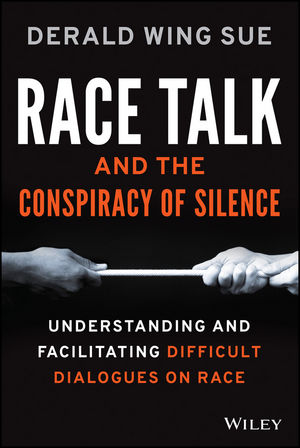When Names Can Really Hurt You: Derald Wing Sue's new book addresses the pitfalls of talking about race
So argues Derald Wing Sue, Professor of Psychology & Education, in his new book, Race Talk and the Conspiracy of Silence: Understanding and Facilitating Difficult Dialogues on Race (Wiley).
(Click here to view Sue’s recent appearance on the globally televised Thom Hartmann show to discuss Race Talk.)
A sequel to Microaggressions in Everyday Life: Race, Gender and Sexual Orientation, his breakout 2010 success, Race Talk extends Sue’s pioneering work on microaggressions, the term coined by Harvard University professor Chester M. Pierce in 1970 that refers to the subtle but highly damaging manifestations in speech and behavior of prejudice and racism, often by people who do not acknowledge their own biases.
Microaggressions are subtle, making it difficult for the victim to respond without being misunderstood as petty or hypersensitive, Sue argues, but they are a serious problem, “often containing a disparaging message to people of color who find them offensive, [and] triggering intense emotional responses.”
Research by Sue and others has shown that unsuccessful dialogue on race has major negative impact on the mental and physical health, classroom and work productivity and problem-solving abilities of persons of color. It is harmful to white Americans, too, diminishing their capacity for empathy and compassion, distorting their perceptions about race, and ultimately blinding them to how racism really works and their own complicity in its perpetuation.
To facilitate successful dialogue about race, Race Talk suggests five things not to do (do nothing, sidetrack the conversation, appease the participants, terminate the discussion, or become defensive); and 11 strategies that increase the chance of success (including understanding your racial and cultural identity; acknowledging and being open to admitting your racial biases; validating and facilitating discussion of feelings; controlling the process, not the content, of talk about race; and validating, encouraging and expressing admiration and appreciation to participants who speak when it feels unsafe to do so).
Race Talk is the product of 10 years of research and observation of people “engaged in difficult conversations on race, racism, whiteness and white privilege,” Sue writes. His research team “discovered that almost all difficult dialogues on race were triggered by racial microaggressions that were often invisible to perpetrators.”
Where Microaggressions in Everyday Life is a scholarly work for mental health practitioners, academics and students, Race Talk is accessible to parents, teachers, trainers, facilitators and anyone else who wants to understand why it’s so difficult to talk honestly about race.
Ironically, race talk is a particular problem in the nation’s increasingly diverse work settings and classrooms, often polarizing coworkers, students and teachers and leading to less clarity and more animosity, Sue said in a recent interview. But while unsuccessful race talk can have disastrous consequences, it can also present “an opportunity for growth, improved communication, and learning” – all of which the nation needs more than ever before. Indeed, despite hopes that the election of President Obama in 2008 signified the dawning of a new “post-racial” era, studies have shown that classrooms and some communities are more psychologically segregated, not less, than they were in the decades immediately following the Supreme Court’s landmark Brown vs. Board of Education ruling.
Policies and strategies that claim to be colorblind are not helpful, because, unconsciously or not, they silence the importance of racial and ethnic identity. “To be colorblind is to be color-mute,” Sue said. Structural, systemic biases—those things need to change. We are disconnected in education from wider society.”
Writing in Race Talk, Sue argues that “The attitudes, beliefs and fears inherent in race talk symbolize our society’s resistance to unmasking the embedded inequities and basic unfairness imposed upon citizens of color. Race talk potentially makes the ‘invisible’ visible and opens gateways to view the world of oppression through realistic eyes. It has the possibility of helping us become nonracist and antiracist.” – Patricia Lamiell
Published Monday, Feb. 2, 2015

